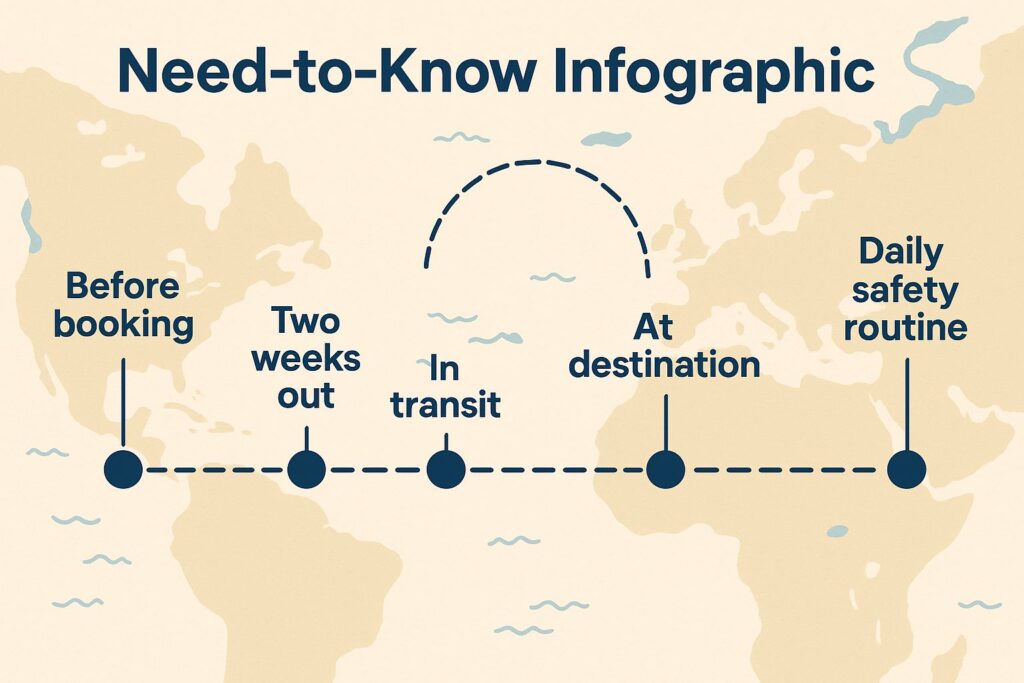Quick-read summary
Secure digital and paper copies of your IDs, register your trip with your government, add both comprehensive and medical-evac insurance, split cash and cards into two hiding places, use a VPN whenever you go online, and trust your instincts. Most safety travel mishaps, from lost passports to digital theft, can be avoided with solid preparation and situational awareness.
Why these tips matter in 2025
International tourism is booming again: the UN World Tourism Organization projects 1.6 billion cross-border trips this year. At the same time, Interpol reports an 18 % rise in travel-related theft and online fraud since 2023, while the World Health Organization lists heatstroke and respiratory illness among the top medical emergencies for travellers. A little forethought goes a long way. The 20 tactics below combine airline safety procedures, consular advice and on-the-ground lessons from seasoned nomads.
1 Pre-trip planning
- Back up your documents—twice. Make colour scans of your passport data page, current visas, vaccination card and driver’s licence. Store one encrypted copy in the cloud (Proton Drive or iCloud with two-factor authentication) and one on your phone in a password-protected folder. Carry two passport-size photos in a hidden pouch for emergency replacements.
- Register your itinerary. Sign up for STEP (U.S. citizens), the UK’s FCDO Travel Aware, or your own country’s equivalent. You’ll receive security alerts and natural-disaster warnings and your embassy can find you faster in a crisis.
- Buy dual insurance. Comprehensive trip insurance covers cancellations and lost luggage but rarely includes medical evacuation. Add a med-evac rider or separate policy; last year a Bangkok-to-Berlin air ambulance averaged US $86 000 (source: IAMAT).
- Create an emergency card. Print the local police, ambulance and fire numbers plus your embassy’s 24/7 phone on a business-card-size slip. Laminate it or tuck it behind your phone case for offline access.
- Pack a micro safety kit. Slip a rubber door-stop alarm, tiny LED torch, blister plasters and a small roll of duct tape into your daypack. They weigh less than 200 g and solve half of life’s little crises.
2 In transit: airports, trains & ride-shares
- Label bags discreetly. Use a luggage tag that hides your home address. List only an e-mail and a partial phone, preventing opportunistic thieves from knowing you’re away.
- Pick strategic seats. Window seats reduce the chance of pickpocketing from overhead bins, while aisle seats within five rows of an exit get you out fastest in an evacuation. Choose based on what worries you more.
- Verify ride-shares. Before you get into an Uber, Bolt or Grab, ask the driver “Who are you collecting?” instead of volunteering your name. Confirm the plate and let a friend track your ride live.
- Lock night-train berths. Upper bunks are harder to reach. Thread a thin cable lock through your pack and attach it to a fixed rail; keep cash and passports in a neck pouch you’ll actually wear.
3 At destination: hotels, streets & scams
- Hotel room triage. On arrival, spot the nearest exit, inspect window and balcony locks and test the smoke detector. At night, wedge the rubber door-stop alarm under the main door for an audible deterrent.
- Blend in on the street. Ditch branded tourist drawstring bags; local grocery totes draw less attention. Learn 10 essential words—hello, please, thank-you, yes, no, numbers one to three and “help”—so you can ask directions without resorting to gestures that scream “visitor.”
- Stay scam-savvy. In Europe this year, a favourite con involves clipboard “surveys” that actually phish for your e-mail and hotel. Politely refuse. Elsewhere, portable card readers with hidden Bluetooth skimmers are on the rise; insist that any payment terminal stays in your sight.
4 Digital & money safety
- Always connect through a VPN. Man-in-the-middle attacks on airport and café Wi-Fi make up 39 % of travel cyber-incidents (source: Kaspersky, 2025). A reputable VPN encrypts traffic and blocks malicious portals.
- Activate two-factor authentication. Turn on 2-FA for banking, e-mail and cloud storage before departure. Choose an authenticator app over SMS codes; roaming messages sometimes fail and are easier to intercept.
- Split your funds. Carry a primary card and limited cash on your person, plus a backup card sequestered in luggage. Add a virtual debit card for online bookings; freeze the number between purchases in your banking app.
- Use ATMs wisely. Withdraw only from bank-branch machines during office hours. Cover the keypad: card skimming rose 12 % in Latin America last year. Decline random strangers’ offers of “better rates” at private machines.
5 Health & emergency preparedness
- Check vaccines six weeks out. Visit CDC or NHS Fit-For-Travel and schedule boosters for tetanus, hepatitis A/B or yellow fever as required. Bring a signed doctor’s letter listing any prescription meds to avoid customs hassle.
- Download SOS and translation apps. SmartTraveler, Sitata or GeoSure push location-based security alerts. Google Translate offline packs let you read pharmacy labels or hospital signs when data is patchy.
- Master basic first aid. Learn compression-only CPR at 100-120 beats per minute and how to spot heatstroke vs. dehydration—two top emergencies for tourists, says the WHO. Pack oral rehydration salts and a digital thermometer.
6 Bonus: Solo-female focus
- Use the “home-check” routine. Share real-time location with a trusted person and set silent check-ins: schedule a disappearing WhatsApp message before you head out; if you don’t delete it by a set time, friends know to follow up. Opt for female-only dorms when available and confirm your driver’s name before you say yours.
Need-to-know info-graphic

Every adventure carries an element of uncertainty, that’s part of the thrill, but risk shouldn’t turn into regret. By following these 20 tips you’ll out-prepare the majority of travellers and free your mind to focus on the wonder of the journey. Bookmark this guide, share it with a friend, and follow us at VayCay Couple for more up-to-date advice on staying safe and travelling smarter.
Until next time, explore our travel guides:
How to Get to Portofino from Genoa
Michelin Star Restaurants in Rome
FAQs
Today’s slim neck pouches and hidden waistband belts remain effective against pick-pockets, if worn under clothing and accessed discreetly.
Statistics show aisle seats within the first five rows of an exit have the quickest egress times (FAA study, 2024).
Yes. Even a three-day city break can involve flight cancellations, lost luggage or medical emergencies that cost more than the insurance premium.
Regulated hotels must meet fire-safety and security standards. A highly rated Airbnb with external safety verification can be comparable; check past reviews for smoke detectors and door locks.
Avoid them. “Juice-jacking” malware can infect devices through compromised ports. Carry your own power bank or plug adaptor.
Dial 112 across the EU and many other regions, 911 in North America, or check local variations such as 000 in Australia before you land.














